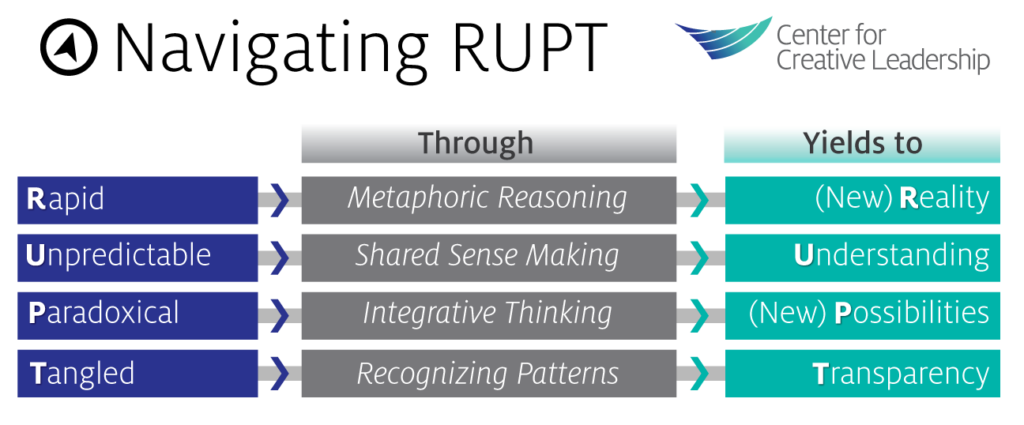Why an Alternative Acronym for VUCA?
Tired of hearing the acronym “VUCA” at work?
Volatility, uncertainty, complexity, and ambiguity: You may be sick of the concepts that VUCA represents — or simply tired of the often-overused acronym itself.
In recent years, many organizations have started liberally using “VUCA” as a way to articulate or find a metaphor for describing the changing world in which we live, work, lead, and play. But this is often done without digging into its meaning.
For several years, we’ve been approached by clients not only to design and deliver programs that help their managers lead through the turbulence that characterizes the modern world, but also asked to specifically avoid using the term VUCA.
We think this is partly because of its U.S. military origins, and partly because VUCA seems to capture neither what they’re experiencing, nor how to lead through it.
RUPT (Rapid, Unpredictable, Paradoxical, and Tangled)
Our Proposed Alternative to the VUCA Acronym
In response, we tapped our own knowledge and research at CCL about leading in complexity and developed an acronym that more readily connects the experience of disruption with the leadership necessary to navigate it.
We suggest RUPT™ as a VUCA alternative. It’s a word in its own right, but not typically used alone. As an acronym, RUPT stands for Rapid, Unpredictable, Paradoxical, and Tangled.
- Rapid: The changes we experience come at us quickly. They overlap with each other like waves emerging from different sources crashing in mid-ocean.
- Unpredictable: We can analyze, strategize, and predict the future, but then something totally unexpected emerges (rapidly), challenging our assumptions and causing us to reframe our thinking.
- Paradoxical: As leaders, we’re so easily lured into believing complex challenges are problems with one right solution, rather than seeing them as polarities that must be leveraged if our teams and organizations are to be effective in both the short and long term. For example, we must innovate for the long term, yet we have current businesses that must be managed both in the short and long term. We might be tempted to choose one or the other, but even for the short term, we really need to do both.
- Tangled: Everything is connected to everything else. We hear terms that imply the connectedness of everything, like “the global village.” We live in multiple ecosystems, all of them having internal and external connections that we might overlook in our attempts to strategize and implement strategy effectively.
The RUPT Acronym, Explained
Rumpere, in Latin, means “to break, to burst.” With the prefix ab-, or “off,” the Latin forms abrumpere, “to break off.” And abruptus is the origin of the English word abrupt.
Rupture is an English word that still retains the literal meaning of “bursting,” as do disrupt and interrupt: all are derived from the same rumpere.
DisRUPTion happens when RUPT is in play and leadership fumbles. For example, here are 3 possible scenarios:
- When an organization isn’t agile, or it over-relies on prediction, to the detriment of adapting;
- When the paradoxical tension between rapid adaptation and stable prediction (to name just one of many paradoxical tensions) freezes leadership; or
- When rapid, unpredictable paradoxes are embedded in “tangled” causes and effect chaotic systems, triggering reactions that are more subjective than linear or logical.
If these challenging situations sound all too familiar, the good news is that RUPT™ also offers competencies for navigating complex challenges:
Ready to Take the Next Step?
Build your team’s capacity for navigating turbulence and disRUPTion with a customized learning journey for your leaders using our research-backed modules. Available leadership topics include Boundary Spanning Leadership, Collaboration & Teamwork, Innovation Leadership, Leading Through Change & Disruption, Learning Agility, Managing Paradox & Polarity, and more.










